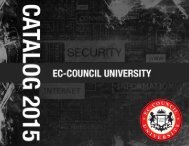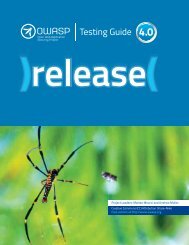4.0
1NSchAb
1NSchAb
- No tags were found...
Create successful ePaper yourself
Turn your PDF publications into a flip-book with our unique Google optimized e-Paper software.
33<br />
Web Application Penetration Testing<br />
2. Create the list of directories that are to be avoided by Spiders, Robots,<br />
or Crawlers.<br />
How to Test<br />
robots.txt<br />
Web Spiders, Robots, or Crawlers retrieve a web page and then recursively<br />
traverse hyperlinks to retrieve further web content. Their<br />
accepted behavior is specified by the Robots Exclusion Protocol of<br />
the robots.txt file in the web root directory [1].<br />
As an example, the beginning of the robots.txt file from http:/www.<br />
google.com/robots.txt sampled on 11 August 2013 is quoted below:<br />
User-agent: *<br />
Disallow: /search<br />
Disallow: /sdch<br />
Disallow: /groups<br />
Disallow: /images<br />
Disallow: /catalogs<br />
...<br />
cmlh$ wget http:/www.google.com/robots.txt<br />
--2013-08-11 14:40:36-- http:/www.google.com/robots.txt<br />
Resolving www.google.com... 74.125.237.17, 74.125.237.18,<br />
74.125.237.19, ...<br />
Connecting to www.google.com|74.125.237.17|:80... connected.<br />
HTTP request sent, awaiting response... 200 OK<br />
Length: unspecified [text/plain]<br />
Saving to: ‘robots.txt.1’<br />
[ ] 7,074 --.-K/s in 0s<br />
2013-08-11 14:40:37 (59.7 MB/s) - ‘robots.txt’ saved [7074]<br />
cmlh$ head -n5 robots.txt<br />
User-agent: *<br />
Disallow: /search<br />
Disallow: /sdch<br />
Disallow: /groups<br />
Disallow: /images<br />
cmlh$<br />
The User-Agent directive refers to the specific web spider/robot/<br />
crawler. For example the User-Agent: Googlebot refers to the spider<br />
from Google while “User-Agent: bingbot”[1] refers to crawler from<br />
Microsoft/Yahoo!. User-Agent: * in the example above applies to all<br />
web spiders/robots/crawlers [2] as quoted below:<br />
User-agent: *<br />
The Disallow directive specifies which resources are prohibited by<br />
spiders/robots/crawlers. In the example above, directories such as<br />
the following are prohibited:<br />
...<br />
Disallow: /search<br />
Disallow: /sdch<br />
Disallow: /groups<br />
Disallow: /images<br />
Disallow: /catalogs<br />
...<br />
Web spiders/robots/crawlers can intentionally ignore the Disallow<br />
directives specified in a robots.txt file [3], such as those from Social<br />
Networks[2] to ensure that shared linked are still valid. Hence,<br />
robots.txt should not be considered as a mechanism to enforce restrictions<br />
on how web content is accessed, stored, or republished<br />
by third parties.<br />
robots.txt in webroot - with “wget” or “curl”<br />
The robots.txt file is retrieved from the web root directory of the web<br />
server. For example, to retrieve the robots.txt from www.google.com<br />
using “wget” or “curl”:<br />
cmlh$ curl -O http:/www.google.com/robots.txt<br />
% Total % Received % Xferd Average Speed Time Time<br />
Time Current<br />
Dload Upload Total Spent Left Speed<br />
101 7074 0 7074 0 0 9410 0 --:--:-- --:--:-- --:--:--<br />
27312<br />
cmlh$ head -n5 robots.txt<br />
User-agent: *<br />
Disallow: /search<br />
Disallow: /sdch<br />
Disallow: /groups<br />
Disallow: /images<br />
cmlh$<br />
robots.txt in webroot - with rockspider<br />
“rockspider”[3] automates the creation of the initial scope for Spiders/<br />
Robots/Crawlers of files and directories/folders of a web site.<br />
For example, to create the initial scope based on the Allowed: directive<br />
from www.google.com using “rockspider”[4]:<br />
cmlh$ ./rockspider.pl -www www.google.com<br />
“Rockspider” Alpha v0.1_2<br />
Copyright 2013 Christian Heinrich<br />
Licensed under the Apache License, Version 2.0<br />
1. Downloading http:/www.google.com/robots.txt




